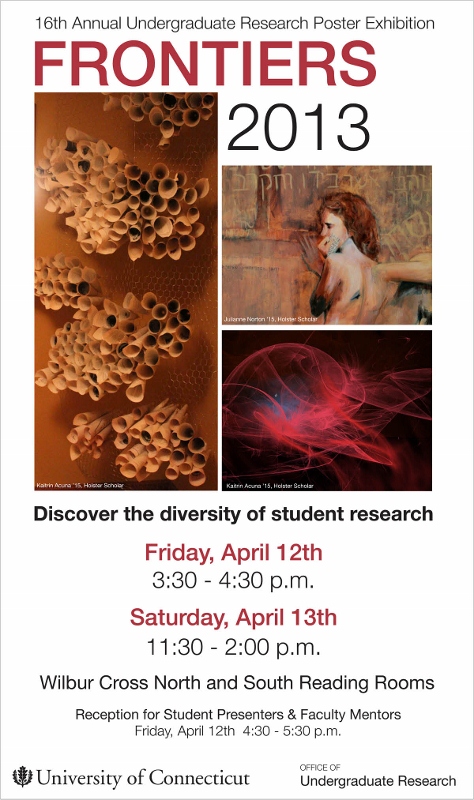UCONN IDEA Grants Program, Office of Undergraduate Research (OUR), Division of Enrichment Programs (Search number 2013566)
The UCONN IDEA Grants Program Coordinator in the Office of Undergraduate Research contributes to the University of Connecticut’s goal of providing undergraduate students with a wide range of opportunities to participate in academic enrichment activities throughout their collegiate careers. UCONN IDEA Grants are available to students through a competitive process. The Program Coordinator will perform advising, administrative, and project-oriented tasks, including relevant research, event, meeting, and communication planning, creation of outreach strategies to undergraduate students, advising of interested undergraduate students, data analysis, along with other program administration and office duties, as required.
Position Duties
This person will work primarily with students and faculty on undergraduate research topics and processes. These duties include:
- Providing advising and administrative assistance to students interested in applying for a UCONN IDEA Grant and related opportunities, including supporting them through the application process.
- Scheduling and preparing materials for and presenting workshops on the UCONN IDEA Grant program and related opportunities.
- Receiving, processing, and reviewing applications ensuring completeness and making referrals to appropriate personnel for review. Maintaining filing system and electronic records.
- Managing communications with students and advisors regarding outcomes of proposals.
- Assisting in the marketing and communication of UCONN IDEA Grant and related opportunities to students, faculty and administrators.
- Managing workflow, drafting online forms, and contributing to quality improvement of forms and application materials.
- Processing and maintaining necessary paperwork, records, and files to support grant program, including fiscal records. Enhancing electronic data systems, where appropriate.
- Conferring with and assisting supervisor in the performance of program administration and activities.
- Evaluating effectiveness of programs and recommending improvements or changes to appropriate manager.
- Responsibility for writing and/or editing informational and promotional materials for use in outreach activities, requiring an understanding of the subject matter.
- Assisting with assessment efforts, assembling data, drafting and/or editing reports.
- Maintain a collection of resource materials and program information.
- Limited travel to relevant national conferences, regional events, and UConn regional campuses.
- May perform office support functions and projects, as assigned.
- Performing related duties as required.
Minimum Qualifications:
- Bachelor’s degree in an appropriate field.
- 3-5 years of office experience in a responsible administrative position that demonstrates knowledge of administrative methods.
- Ability to provide higher-level administrative office support.
- Demonstrated ability to work independently.
- Excellent multi-tasking and interpersonal skills.
- Strong writing and communication skills.
- Familiarity with computers as a skilled user of word processing programs and electronic data systems such as Word, Excel, Access, FileMaker and database reports.
Preferred Qualifications:
- Graduate degree in an appropriate field, including but not limited to higher education counseling or administration, natural or physical sciences, social sciences.
- Familiarity with competitive grant and award programs.
- Experience working with faculty across disciplines.
- Experience in an undergraduate research office or honors program or college.
- Experience at a large university.
- Experience with Peoplesoft and other database software.
- Experience with data analysis, database design, and program evaluation.
- Experience in designing or updating web pages, forms, and social media using relevant software (e.g. Dreamweaver, WordPress, wufoo, HootSuite).
Appointment Terms: This is a grant-funded full-time end-dated position; position end-date June 2015.
To Apply
For full consideration upload a letter of application, a resume, and a list of 3 professional references with contact information via Husky Hire (http://www.jobs.uconn.edu/). Include search number on all correspondence. Screening of applications will begin immediately and continue until position is filled.
The University of Connecticut is an EEO/AA employer.
